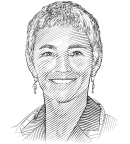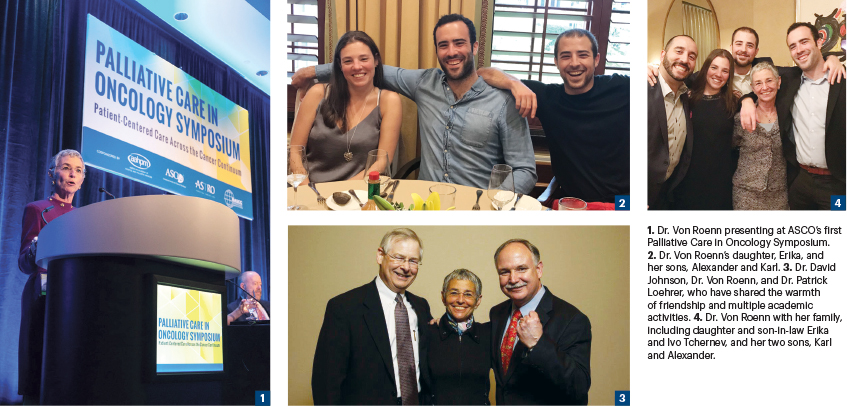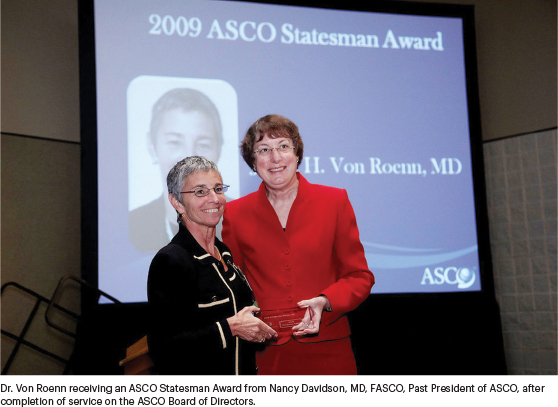Jamie H. Von Roenn, MD, FASCO, grew up in the suburbs of Chicago as the middle child of three girls. She was, by her own account, extremely shy by nature. Her mother was a graduate of the University of Chicago, but her father’s college education was preempted by his service as a fighter pilot in World War II. “My father was the definition of the self-made man, and he was the strongest mentor and promotor of success I ever had. He believed that you could do anything if you wanted it badly enough, and he instilled that drive in me at an early age. He was kind of the ultimate mentor-coach,” said Dr. Von Roenn.
Her mother complemented her father’s utilitarianism with what Dr. Von Roenn described as an abundance of compassion and empathy. “I never heard my mother say a bad word about anyone. She was the gentlest person I’d ever known. We used to buy shoes from someone who sold samples, because that’s where you’d find smaller sizes. We went to a house to buy shoes and the place was dirty and in disarray—there were even piles of dog poop on the floor. My father was livid about the conditions of the shoe-seller’s house, but my mother remarked: ‘Oh Marty, they’re just casual people.’ That was her to a T; she only saw the good in people. For my whole life, I’ve tried to be as kind as her,” said Dr. Von Roenn.
Jamie H. Von Roenn, MD, FASCO

TITLE
Vice President of Education, Science, and Professional Development, ASCO
MEDICAL DEGREE
MD, Rush Medical College
ON HER WORK DURING THE AIDS CRISIS
“I went to a lot of funerals. I spoke at memorial services and I visited people at home. Visiting people at home under those conditions was a remarkable experience that gives you a deeper understanding about their situation and emotional needs. That was such a fruitful time. It enriched me as a physician, giving me a much more intimate view of the full human scope of diseases like AIDS.”
Looking for Answers on the Fringe
Once Dr. Von Roenn and her sisters turned 16, their father required them to get jobs. “This will date me, but my first job when I was 16 was as a long-distance telephone operator. Every now and then, because my father worked from home, I’d connect him on a business call. I worked that job all through school, summers also. I saved a ton of money, which helped later in my travels,” reminisced Dr. Von Roenn.
A young 1960s idealist, Dr. Von Roenn first thought about becoming a special education teacher, since she wanted a career that helped people through difficult situations. “I graduated from high school in 1970 and went to the University of Illinois in Champaign because they had an excellent special ed program. Unfortunately, I hated it. It was all large 101 lectures, which I found boring and too much like high school. So, I dropped out of college my first year and went to an education alternative opportunity in Cuernavaca, Mexico. It was a radical, new-age look at changing the education system,” Dr. Von Roenn recalled.
She learned Spanish, took classes for a while, and then hitchhiked alone through Mexico for 3 months. “Now, as a parent, I can’t imagine how my parents supported my decision. But the experience broadened my perspectives, forced some of my shyness away, and made me more independent. During my adventure, I decided I wanted to go back to school, but to a place that offered an independent platform. So, I returned to the States and enrolled at Sarah Lawrence, a small liberal arts school, where I majored in psychology, still planning to pursue a career in special ed,” said Dr. Von Roenn.
A Camp for Troubled Kids Sparks a Career Change
At Sarah Lawrence College, Dr. Von Roenn’s mentor was a psychiatrist who also ran an 8-week overnight summer camp for 6- to 12-year-olds with severe emotional disabilities. Dr. Von Roenn, who had been a swimming instructor in high school, was invited to teach swimming at the summer camp.
“They were very troubled kids, but after about 6 weeks, I saw a remarkable improvement in their behavior. But when their parents visited, I saw why the kids were there in the first place. Once the parents left, the kids were fine again. It blew my mind. Next summer, I was Head Counselor and saw the same phenomenon. I knew I couldn’t change the kids’ home environment, which was the root cause of their problems, so special ed didn’t offer an opportunity to make the kind of impact I wanted from a career,” said Dr. Von Roenn. She added: “When I expressed that concern to the camp director, he said medicine was where I could really make an impact on a large human scale. I agreed, so I left Sarah Lawrence and entered a premed program at the University of Illinois. I did all of my premed coursework in four straight semesters.”
After receiving her undergraduate degree, Dr. Von Roenn was accepted to Rush University Medical College in Chicago. “However, there was a free, several-month period before beginning med school, and I took the opportunity to backpack through Europe on my own, taking trains and staying in youth hostels. Like my solo trip in Mexico, my European trip, which lasted about 6 months, was a wonderful growth experience,” noted Dr. Von Roenn.

Discovering Mentors
Unfortunately, Dr. Von Roenn’s first year at Rush University Medical School was disappointingly reminiscent of her dull, rote-learning undergrad experience at the University of Illinois. However, a chance meeting with the Head of Pathology, Ronald S. Weinstein, MD, led to an exciting laboratory venture that kindled and eventually confirmed Dr. Von Roenn’s desire to pursue a career in oncology. “Along with initiating my interest in oncology, pathology was also where I met my future husband. He was a neurosurgery resident—and, at that time, they had to spend 6 months in pathology, examining the brains during autopsies. So, I literally met my husband over a dead body,” she recalled.
Her interest in oncology landed Dr. Von Roenn a 3-month rotation at the National Cancer Institute (NCI), where she met a valued mentor, Edward Gelmann, MD, who wrote glowing recommendation letters that helped her fellowship application process. “When I was at NCI in Washington, DC, my then-boyfriend, who was in Chicago, and I were writing back and forth daily. It became obvious that our relationship was moving along, so one night I paged him and said: ‘Dr. Von Roenn, will you marry me?’ He said, ‘How about tomorrow?’, but I suggested June, and that’s when we married.”
Dr. Von Roenn observed: “I had some wonderful oncology mentors during medical school and residency. I’d say the star mentor was Pat Loehrer, MD. He gave me support and advice that really helped shape my career. He is the model of humility and personalized care. We’ve remained close over the years and speak quite frequently.”
“I can’t overstress the importance of mentors,” continued Dr. Von Roenn, “and how young students and doctors need different mentors during their careers. For instance, Janet Wolter, MD, an early National Surgical Adjuvant Breast and Bowel Project member, was my primary mentor during my fellowship, a true model of individualized care. She also advised me not to take my first job at Rush, which had a limited program, but at Northwestern, which was a broad-based academic setting. So, that’s where I ended up.”
An Awakening Leads to a Lifelong Career
When asked what led to her interest in palliative care, Dr. Von Roenn responded: “In my first month as an attending physician, what struck me was how sick we made people with cancer therapies. Back then, the median survival for solid tumors was 6 to 9 months, at best. I have a lucid memory of going to the supermarket, and there in the parking lot was one of my patients, who was vomiting. I’d given her doxorubicin, and there were no effective antiemetics. I also knew that we had tools to manage pain, but we weren’t taught pain medicine in school. It was very demoralizing. That was when I began to think about a career in symptom management.”
I applied for an American Cancer Society grant about improving pain management in the medical oncology unit, and I’m glad to say that paper changed the way we thought about treating pain in the oncology setting.— Jamie H. Von Roenn, MD, FASCO
Tweet this quote
Shortly after Dr. Von Roenn arrived at Northwestern University, a new Hematology-Oncology Chair was appointed, Sigmund Weitzman, MD, who had previously been at Harvard University. “He was very supportive of my interest in palliative medicine, which meant a lot given that at the time, it was a discipline on the outer edge of mainstream oncology. Also,” she added, “Northwestern had a hospice program that needed a Medical Director. Since I referred quite a few patients to the program, they asked me to assume the role of Director, which I did, serving for many years.”
At the Epicenter of the AIDS Crisis
Dr. Von Roenn’s first submitted grant was practice changing. “I applied for an American Cancer Society grant about improving pain management in the medical oncology unit, and I’m glad to say that paper changed the way we thought about treating pain in the oncology setting. The hospice was primarily cancer, but in the late 1980s, we began seeing a lot of patients with AIDS. At that time, Robert Murphy, MD, an infectious disease specialist and the leader of global oncology at Northwestern, pulled me in to see these patients because they had infections and cancers. So, from the mid-1980s to early 2000, my whole practice was AIDS-related oncology,” she noted.
Dr. Von Roenn observed that the hospice was filled with young men dying of AIDS. “It was a devastating clinical experience, but it was also enlightening, seeing the courage and dignity these men had under unimaginable circumstances, having this deadly disease and also being stigmatized and isolated. But it was also intellectually stimulating in that I saw presentations of things I’d never seen, over and over. It made you think so broadly about diagnostic and clinical possibilities,” said Dr. Von Roenn.
She continued: “During that period, I went to a lot of funerals. I spoke at memorial services and visited people at home. Visiting people at home under those conditions was a remarkable experience that gives you a deeper understanding about their situation and emotional needs. That was such a fruitful time. It enriched me as a physician, giving me a much more intimate view of the full human scope of diseases like AIDS.”

Joining ASCO Leadership
Dr. Von Roenn has been active in various volunteer leadership roles at ASCO since 1986, including serving on the Board of Directors; the Palliative Care Task Force; the Scientific Program, Cancer Education, and Cancer Communications committees; the Cancer.Net Editorial Board; and the Leadership Development Working Group. In 2009, she became an ASCO Fellow (FASCO), and in 2011, she received the ASCO-ACS Award and presented the accompanying lecture at the Annual Meeting, which she titled “Personalized Medicine: A Comprehensive Definition.”
In 2013, Dr. Von Roenn assumed the position of ASCO’s Senior Director of the Education, Science, and Professional Development Department. “ASCO is a progressive organization that is open to new ideas, which is a large reason why I took the position in education and why I enjoy my work so much. If you come up with a reasonable plan, you get full support from the Society. In academics, the pace of change is so much slower, and it is very hard to move the ship. I love that ASCO has given me this opportunity. In fact, I’m currently in the middle of a master’s degree in medical education, which will bolster my ability to effect the kind of changes I believe are needed,” she said.
How does an extremely busy ASCO leader decompress? “I’m an exercise fanatic. I also love to cook and read. But in truth, the biggest way to decompress is to be with people I love, and this past year, given all the limitations, has been particularly difficult. But I see a light at the end of this dark tunnel and that, plus my work at ASCO, keeps me motivated and positive for the future.”

